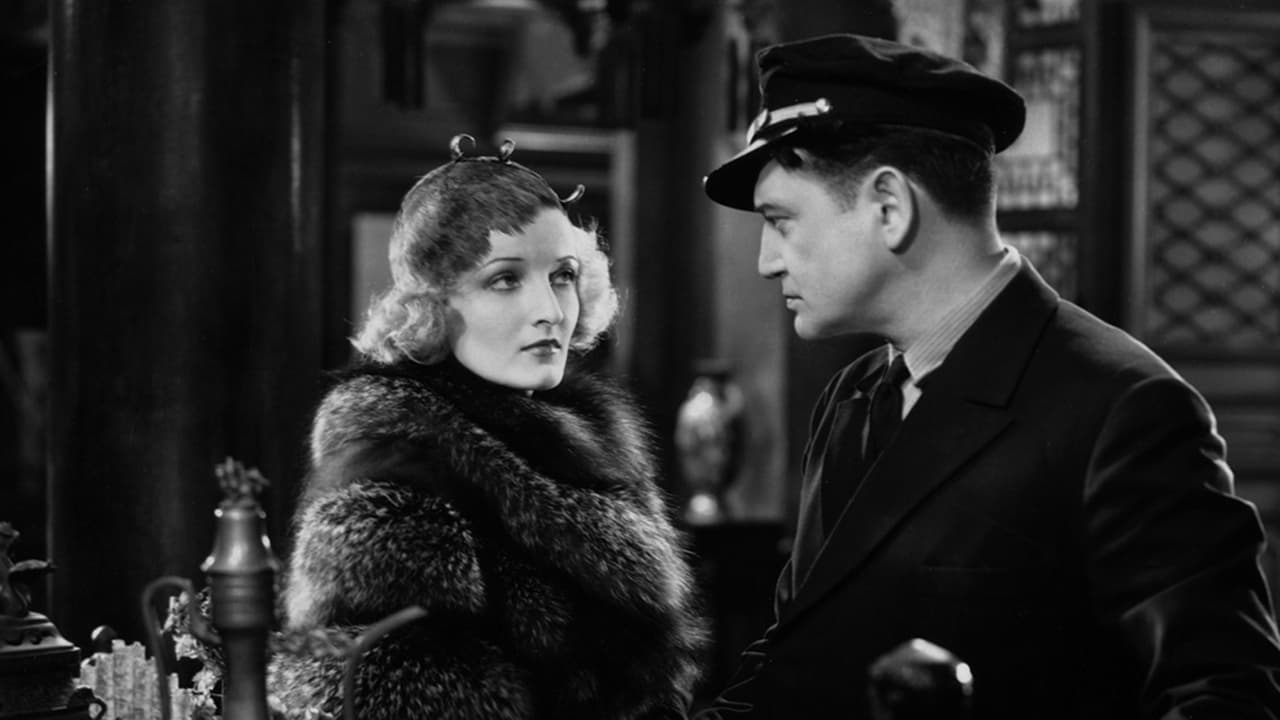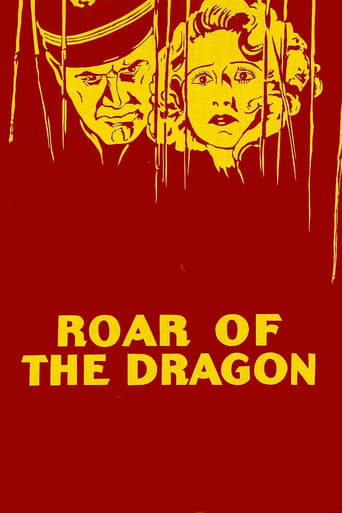



Great Film overall
Boring, over-political, tech fuzed mess
A brilliant film that helped define a genre
It's the kind of movie you'll want to see a second time with someone who hasn't seen it yet, to remember what it was like to watch it for the first time.
View MoreIt seems that Hollywood's initial view of Asian culture was not a very pretty one, with Tong Wars, evil war lords, and such characters as Fu Manchu to express the dark side of humanity. Getting away from Warner Oland and Boris Karloff as Fu Manchu here, the writers turn a Russian bandit (C. Henry Gordon in one of his many villain roles) as the bad guy, a bandit so vile that he even has forced an exotic beauty (Gwili Andre) to become his unwilling mistress. As the film opens, Gordon is spouting venom towards Richard Dix, a drunken hero, who apparently in combat bit his ear off. Gordon is obviously a tough guy because he can have the ear literally soldered back on with a hot iron (ouch!) without so much as a drop of whiskey or a pencil to bite on. Andre, looking very much like a combination of Dietrich, Garbo and Tallulah, is an exotic beauty, a shady lady of ill repute, and her presence is immediately unforgettable. She makes a determination to end this vile captivity as Gordon and his gang of various Asian races descend on Manchuria and the inn where she is being held against her will, even to the point of planning her own suicide should he arrive before she can escape.There's all sorts of other characters there, a sort of "Petrified Forest" gang awaiting their fate, and here, cowards become heroes, the greedy become noble, and some loose their lives as they become imprisoned in the inn where two of the bandit's men report every activity to Gordon and scheme to starve them out as rations and water literally evaporate. Edward Everett Horton is very good as the coward who ends up a hero, exploding in delight as he takes over a machine gun, while Zasu Pitts (the female version of Horton with her constant cry of "Oh, dear!") simply rings her hands and expresses her own fears. Stage veteran Dudley Digges (the villain of the original "Maltese Falcon") is notably self-serving as a pompous fool so convinced of his own importance that he doesn't mind seeing children thrown into the river if it means he'll be able to add more food to his already fat belly. But don't rule his character out from learning a lesson, and while it's never revealed as to why he changes, it's a nice surprise when he comes around to becoming a human being. The effeminate Horton even gets a slight romance with the sweet Arline Judge who becomes den mother to the many Chinese children trapped inside.Filled with lots of action, slight touches of comedy and more than its share of pre-code innuendo, this fascinating drama may not be the most politically correct (oh, that phrase...) of early Hollywood movies, and like many Asian set movies of the 1930's and 40's, some of the stereotypes are eye-raising and head-shaking. But as entertainment, it never fails to keep audience interest, beautifully photographed and never lacking in action and movement. It's even better than some of the most remembered Asian set films ("Shanghai Express" and "The Bitter Tea of General Yen") simply because the pace never slows to allow the audience to be bored. It's a good old fashioned nail biter, popcorn chewer and arm grabber of a movie, wonderfully directed by Wesley Ruggles and filled with moments you won't soon forget.
View More"Roar of the Dragon" (1932) and "Barricade" (1939) have essentially the same plots (as well as length). In China in the 1930s, Mongol raiders corner westerners in a building. It is in a hotel in the former; it is in the US embassy in the latter. They are refugees from a riverboat in the former; they are refugees from a train in the latter. The leading man in the former is an alcoholic riverboat captain; the leading man in the latter is an alcoholic reporter.The IMDb rating for the former is 6.5; the rating for the latter is 5.7. Those ratings, in my opinion, should be reversed. The "Roar of the Dragon" lacks memorable scenes, while, despite its many production problems, "Barricade" has several (such as Baxter and Faye fleeing across a wheat field while the raiders try to burn them out).Additionally, the "Roar of the Dragon" suffers from numerous problems. And it is hard not to have them detract from one's enjoyment. There are plot problems. No one suggests boarding-up the hotel's windows and doors, and, as a result, one person is killed and another kidnapped. The raiders make no attempt to destroy the refugee's only means of escape, the riverboat, even though it is docked nearby and virtually undefended. There are stupidity problems. The hero makes no attempt to ferret out the spies he has been informed lurk within the hotel, or even to exercise caution by having guards protect his limited water supplies. There are coincidence problems. A main character is killed when the hero's machine gun jams just as the other is being attacked. On the other hand, other than the question of "who put the rug over the trap door?" when the embassy refugees retreat into the cellar, the actions in "Barricade" proceed quite logically, given the situation cast members are said to be in.So my advice, therefore, is to skip "Roar of the Dragon" and watch "Barricade" instead
View MoreA collection of natives and Westerners barricade themselves in an old Chinese inn against the onslaught of fierce Tartar bandits.ROAR OF THE DRAGON is a very fine adventure film, with suspense & humor, plenty of excitement, first rate production values and good acting. It is indeed difficult to find anything to dislike about the movie and it stands up nicely to comparison with other similarly themed pictures of the period - SHANGHAI EXPRESS (1932), THE MASK OF FU MANCHU (1932) & THE BITTER TEA OF GENERAL YEN (1933).Richard Dix creates another sturdy performance as the alcoholic riverboat captain who takes charge in defending the folks sheltering in the inn. Dix gives us a character who's sensible, brave and absolutely no nonsense in dealing with deadly danger. But the film has another champion as well, and this one refreshingly unlikely. Wonderful character actor Edward Everett Horton eschews his normal Nervous Nellie nuances and rewards us with a civil servant who vigorously fights back against the terrorists, heroically aiding Dix despite terrible odds. He even gets to enjoy some tender romance before the film ends, leaving us with a most memorable characterization.Two lovely ladies grace the film - Gwili Andre as the mysterious gun-toting doll sought by the bandit chief and Arline Judge as the girl from Bridgeport, Connecticut, who finds love in the most unexpected place. Comedienne ZaSu Pitts plays the timid Lady from Omaha, thoroughly regretting her decision to travel around the world. Dudley Digges is the cowardly owner of the stranded riverboat, degraded enough to steal goat's milk from orphans. C. Henry Gordon is delightfully repulsive as the Russian leader of the bandits, whom we first encounter cauterizing the remains of his left ear, bitten off by Dix in a previous encounter.Movie mavens will spot an uncredited Willie Fung at the end of the picture playing a Chinese sailor.
View MoreAlmost everything else I planned to say has been said by someone else here-- this is unusually zippy for a movie by the normally mediocre Wesley Ruggles, that big lummox Richard Dix is unusually animated and even amusing at times, the production design and cinematography are very handsome (and female leads Andre and Judge ain't bad to look at either), it's probably the only movie in which Edward Everett Horton handles a machine gun (although he does prove pretty handy with a pistol in 1938's Wild Money), and while the movie seems a bit underwritten (or more likely written in 3 days), it's pretty everything you could want from a 68-minute pre-Code B movie. The other interesting thing I would note is that it could have inspired bits in two much more famous movies-- the whole opening, in which news of a bandit's rampage is conveyed by telegraph until the moment that the bandit's men chop down the telegraph pole, plays like a dry run for the much more famous and accomplished opening of Stagecoach-- and it's hard to think that's an accident when you know that co-writer, and RKO producer during this time, Merian C. Cooper (of King Kong fame) would soon work with John Ford on The Lost Patrol (as well as on most of his immediate postwar work). The connection with Howard Hawks is less obvious, but when you consider the situation (tough guy Dix surrounded in compound with a bunch of people whose ability to defend themselves is doubtful), and then hear him refer to Arline Judge by a nickname-- the town she was from ("Bridgeport")-- and hear her answer in a deep, insolent Betty Bacall-Angie Dickinson drawl, there's a definite whiff of the much later Rio Bravo, in which John Wayne is holed up with a bunch of questionable help and a girl called Feathers.
View More